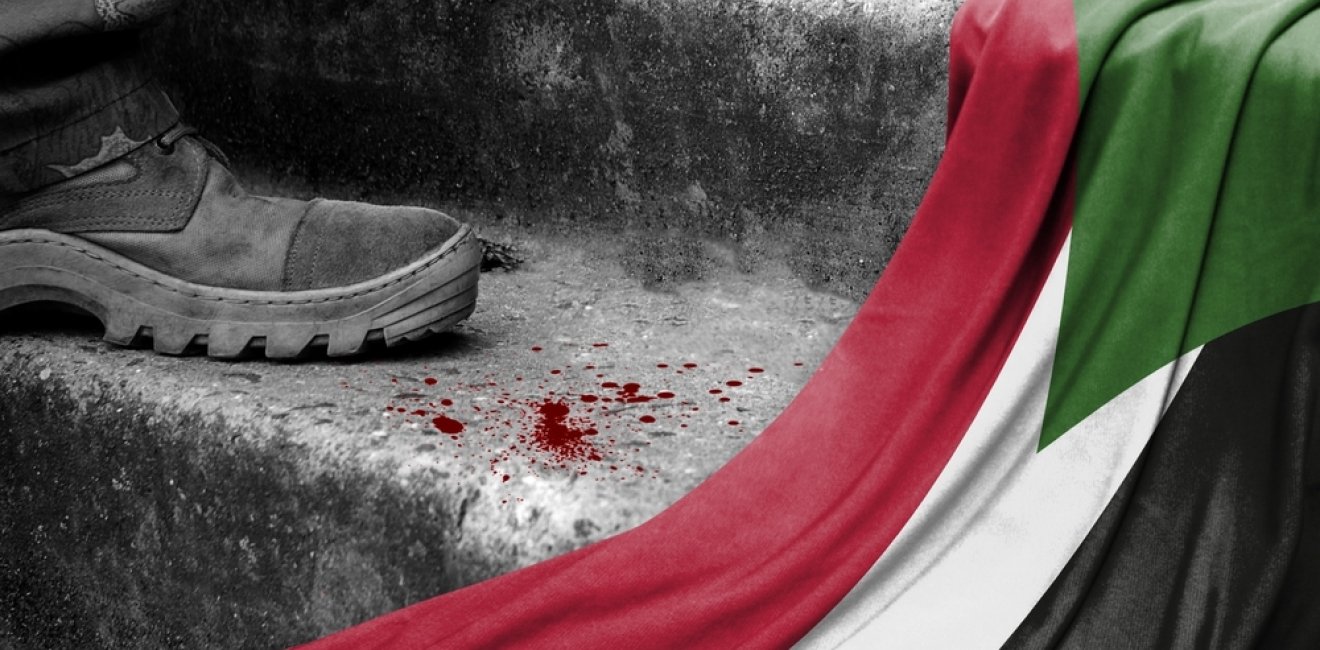Sudan’s war between the regular army and the paramilitary Rapid Support Forces (RSF), currently raging in the capital city Khartoum and the Darfur and Kordofan regions, has entered its fourth month with no sign of a deal to stop it.
The war has already claimed the lives of thousands of people who have died from direct fire, and some from hunger—trapped inside their houses and unable to find food due to intense street fighting. Many buried their loved ones inside their own homes.
Western indifference
Some international and regional peace efforts took place at the war's start but with insignificant effect on the situation on the ground. Most notably, in the first few days, the United States and Saudi Arabia tried to secure ceasefires to create humanitarian corridors. However, of the 12 ceasefires declared, none were successful. The fighting has never stopped, leaving millions of civilians with zero access to lifesaving aid.
The fighting has never stopped, leaving millions of civilians with zero access to lifesaving aid.
Sudan quickly fell out of the news cycle a few weeks after the war began when foreign nationals were successfully evacuated—resembling Afghanistan in August 2021 when the United States pulled out its troops after 20 years. Meanwhile, stories of Sudanese and their suffering have become far less interesting to international audiences than the war in Ukraine and the quick response by the West.
Sudan typically only makes it into the headlines if the story is attached to Wagner Group and Russia. Though some reports suggested that the Wagner group has links with the RSF, no evidence supports that claim.
Intelligent sources in Libya have told me that the RSF is getting support from the United Arab Emirates through Wagner-controlled areas in the Central African Republic. This may be correct, especially after the RSF captured the strategic army base of Om Dafoug on the border between the two countries. The RSF now has control all the way from Om Dafoug to Omdurman, the twin city of Khartoum on the west bank of the Nile River.
This control makes it easy for them to smuggle weapons to the capital city, Khartoum. A media report suggested that at least 28 flights between the UAE and CAR took place within two weeks in May, with stops at the Entebbe airport in Uganda.
Lack of US leadership
The US and Saudi Arabia, with their huge sway over the fighting generals, Abdulfatah al-Burhan, head of the Sudanese army, and Mohamed Hamdan Daglo (better known as Hemti), head of the RSF, seem not to be bothered about the struggle of millions of us who are now trapped in the cities of Khartoum, Darfur and al-Obied. This was demonstrated very clearly when they announced they would be pausing talks in Jeddah for Eid al-Adha festivals while the Sudanese people remained under constant bombardment by the army’s air force and heavy artillery and attacked in their houses by the RSF in the capital and by its militias in Darfur.
Some economic sanctions have been imposed on both warring parties by the United States, freezing the assets of some companies that are known to support them financially. A similar step was taken by the United Kingdom last week but had no effect. The warring parties have maintained their businesses all along, as did the former regime of Omar al-Bashir, which survived 20 years of sanctions by the US by forming alliances with China and Russia. The army’s supporters here in Khartoum suggest the same to alleviate pressure from these sanctions.
Some economic sanctions have been imposed on both warring parties by the United States, freezing the assets of some companies that are known to support them financially.
With its strong connections to Russia, the army sent a delegation to Moscow earlier this month headed by Malik Agar, the new deputy head of the sovereign council. The army showed its potential to follow in the footsteps of Bashir by attacking Western representatives. Its delegates declared the head of the United Nations mission in the country, Volker Perthes, “persona non grata” two weeks after the army chief accused him of inflaming the conflict and called for his removal. After that, they refused the initiative from the regional body, the Intergovernmental Authority on Development (IGAD), currently headed by Kenya, instead accepting Egypt’s initiative, the summit on Sudan, despite producing the same recommendations.
Conditions on the ground
Eighty percent of hospitals have been forced to close, with very few pharmacies still functioning. Food prices have increased sharply, and many have limited access after the army hit many markets in Khartoum and Omdurman, killing dozens of civilians, including women and children. Many people have died of avoidable diseases for lack of healthcare. Furthermore, the RSF bombed people inside their medical facilities.
Food prices have increased sharply, and many have limited access after the army hit many markets in Khartoum and Omdurman, killing dozens of civilians, including women and children.
About 50% of the city’s population has fled. Those who remain are here for financial or health reasons, and many more who stay hail from provinces where fierce fighting is ongoing, like Kordofan and Darfur in Western Sudan.
The city and all its strategic locations have been occupied by RSF fighters, except three, the Wadi Saeedna airbase, the engineer corps, and the al-Shajara artillery corps in Khartoum. It was not difficult for them to take control despite being only half the size of the regular army, which controls 80 percent of the economy. All the income goes to the pockets of the generals, while the soldiers only earn about $16 a month. Despite this leverage, the RSF seems more willing to negotiate, while army leaders refuse.
Many media reports suggest that former regime elements have been fighting alongside the army. It seems that they have influenced decisions within the army to the point where the former rulers, the National Congress Party, issued a statement warning General Shams al-Din Kabashi, who announced the potential start of negotiations with the RSF in Jeddah and that the army is open to have a civilian government until upcoming elections, against such a move.
Pressuring both sides
In order for the United States and the international community to make the army and the RSF sit down and talk seriously to end the misery of the Sudanese people, they need to use their leverage over the UAE, Egypt, and Saudi Arabia. According to some reports from Chad, the UAE managed to send military equipment through Amdjarass airport near the Sudanese border to the RSF. Many reports have suggested that Egypt has also intervened militarily using its air force to hit two RSF convoys, one coming from Libya and the other from Kordofan to Omdurman. Unless pressure is put on the UAE and Egypt to stop supporting the two warring sides, the prolonged conflict will destabilize the whole region from the Sahel to the Horn of Africa.
The Kenyan president, William Ruto, has been the only public leader to warn against crimes in Darfur that might reach the level of genocide after the killing of thousands of civilians from the Massaleet community, including the governor and the brother of the traditional leader, in one city by Arab militias backed by the RSF. This has led to the displacement of hundreds of thousands more people to neighboring Chad.
This has led to the displacement of hundreds of thousands more people to neighboring Chad.
Monitoring the ceasefire needs on-the-ground mechanisms that can be established through sending peacekeeping forces to Khartoum and Darfur with a limited mission—all past ceasefires have been violated by the two sides for lack of monitoring. The suggestion of the IGAD, however, to send eastern African forces might lead to huge resistance from the former regimes’ military elements, which could lead to resurfacing of jihadist groups such as Boko Haram and ISIS; all have cells in Khartoum and some of their members have broken out of Sudanese prisons.
The best solution would be to exert pressure on both sides—as the United States did when the Comprehensive Peace Agreement between North and South Sudan was signed in 2005. In order to do so, it must get all the rebel groups in South Kordofan and Darfur and the civilians in Khartoum to participate.
The views expressed in these articles are those of the author and do not reflect an official position of the Wilson Center.







